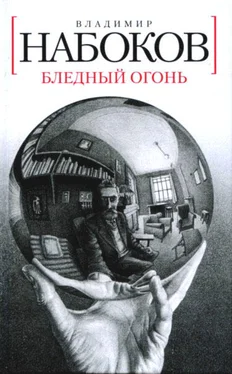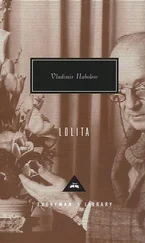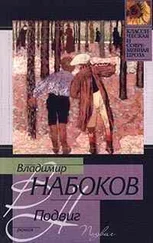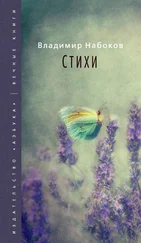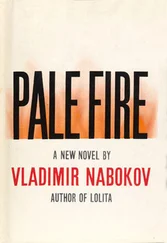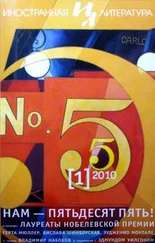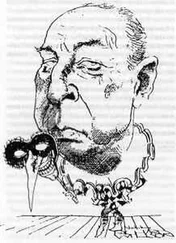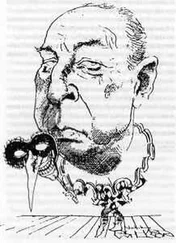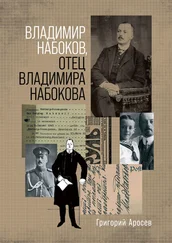I realized, of course, that it was made
Not of our atoms; that the sense behind
710 The scene was not our sense. In life, the mind
Of any man is quick to recognize
Natural shams, and then before his eyes
The reed becomes a bird, the knobby twig
An inchworm, and the cobra head, a big
Wickedly folded moth. But in the case
Of my white fountain what it did replace
Perceptually was something that, I felt,
Could be grasped only by whoever dwelt
In the strange world where I was a mere stray.
720 And presently I saw it melt away:
Though still unconscious I was back on earth.
The tale I told provoked my doctor's mirth.
He doubted very much that in the state
He found me in «one could hallucinate
Or dream in any sense. Later, perhaps,
But not during the actual collapse.
No, Mr. Shade.»
But, Doctor, I was dead!
He smiled. «Not quite: just half a shade,» he said.
However, I demurred. In mind I kept
730 Replaying the whole thing. Again I stepped
Down from the platform, and felt strange and hot,
And saw that chap stand up, and toppled, not
Because a heckler pointed with his pipe,
But probably because the time was ripe
For just that bump and wobble on the part
Of a limp blimp, an old unstable heart.
My vision reeked with truth. It had the tone,
The quiddity and quaintness of its own
Reality. It was. As time went on.
740 Its constant vertical in triumph shone.
Often when troubled by the outer glare
Of street and strife, inward I'd turn, and there,
There in the background of my soul it stood,
Old Faithful! And its presence always would
Console me wonderfully. Then, one day,
I came across what seemed a twin display.
It was a story in a magazine
About a Mrs. Z. whose heart had been
Rubbed back to life by a prompt surgeon's hand.
750 She told her interviewer of «The Land
Beyond the Veil» and the account contained
A hint of angels, and a glint of stained
Windows, and some soft music, and a choice
Of hymnal items, and her mother's voice;
But at the end she mentioned a remote
Landscape, a hazy orchard — and I quote:
«Beyond that orchard through a kind of smoke
I glimpsed a tall white fountain — and awoke.»
If on some nameless island Captain Schmidt
760 Sees a new animal and captures it,
And if, a little later, Captain Smith
Brings back a skin, that island is no myth.
Our fountain was a signpost and a mark
Objectively enduring in the dark,
Strong as a bone, substantial as tooth,
And almost vulgar in its robust truth!
The article was by Jim Coates. To Jim
Forthwith I wrote. Got her address from him.
Drove west three hundred miles to talk to her.
770 Arrived. Was met by an impassioned purr.
Saw that blue hair, those freckled hands, that rapt
Orchideous air — and knew that I was trapped.
«Who'd miss an opportunity to meet
A poet so distinguished?» It was sweet
Of me to come! I desperately tried
To ask my questions. They were brushed aside:
«Perhaps some other time.» The journalist
Still had her scribblings. I should not insist.
She plied me with fruit cake, turning it all
780 Into an idiotic social call.
«I can't believe,» she said, «that it is you!
I loved your poem in the Blue Review.
That one about Mon Blon. I have a niece
Who's climbed the Matterhorn. The other piece
I could not understand. I mean the sense.
Because, of course, the sound — But I'm so dense!»
She was. I might have persevered. I might
Have made her tell me more about the white
Fountain we both had seen «beyond the veil»
790 But if (I thought) I mentioned that detail
She'd pounce upon it as upon a fond
Affinity, a sacramental bond,
Uniting mystically her and me,
And in a jiffy our two souls would be
Brother and sister trembling on the brink
Of tender incest. «Well,» I said, «I think
It's getting late…»
I also called on Coates.
He was afraid he had mislaid her notes.
He took his article from a steel file:
800 «It's accurate. I have not changed her style.
There's one misprint — not that it matters much:
Mountain, not fountain. The majestic touch.»
Life Everlasting — based on a misprint!
I mused as I drove homeward: take the hint,
And stop investigating my abyss?
But all at once it dawned on me that this
Was the real point, the contrapuntal theme;
Just this: not text, but texture; not the dream
But a topsy-turvical coincidence,
810 Not flimsy nonsense, but a web of sense.
Yes! It sufficed that I in life could find
Some kind of link-and-bobolink, some kind
Of correlated pattern in the game,
Plexed artistry, and something of the same
Pleasure in it as they who played it found.
It did not matter who they were. No sound,
No furtive light came from their involute
Abode, but there they were, aloof and mute,
Playing a game of worlds, promoting pawns
820 To ivory unicorns and ebony fauns;
Kindling a long life here, extinguishing
A short one there; killing a Balkan king;
Causing a chunk of ice formed on a high-
Flying airplane to plummet from the sky
And strike a farmer dead; hiding my keys,
Glasses or pipe. Coordinating these
Events and objects with remote events
And vanished objects. Making ornaments
Of accidents and possibilities.
830 Stormcoated, I strode in: Sybil, it is
My firm conviction — «Darling, shut the door.
Had a nice trip?» Splendid — but what is more
I have returned convinced that I can grope
My way to some — to some — «Yes, dear?» Faint hope.
Now I shall spy on beauty as none has
Spied on it yet. Now I shall cry out as
None has cried out. Now I shall try what none
Has tried. Now I shall do what none has done.
And speaking of this wonderful machine:
840 I'm puzzled by the difference between
Two methods of composing: A, the kind
Which goes on solely in the poet's mind,
A testing of performing words, while he
Is soaping a third time one leg, and B,
The other kind, much more decorous, when
He's in his study writing with a pen.
In method В the hand supports the thought,
The abstract battle is concretely fought.
The pen stops in mid-air, then swoops to bar
850 A canceled sunset or restore a star,
And thus it physically guides the phrase
Toward faint daylight through the inky maze.
But method A is agony! The brain
Is soon enclosed in a steel cap of pain.
A muse in overalls directs the drill
Which grinds and which no effort of the will
Can interrupt, while the automaton
Is taking off what he has just put on
Or walking briskly to the corner store
860 To buy the paper he has read before.
Why is it so? Is it, perhaps, because
In penless work there is no pen-poised pause
And one must use three hands at the same time,
Having to choose the necessary rhyme,
Hold the completed line before one's eyes,
And keep in mind all the preceding tries?
Or is the process deeper with no desk
To prop the false and hoist the poetesque?
For there are those mysterious moments when
870 Too weary to delete, I drop my pen;
I ambulate — and by some mute command
The right word flutes and perches on my hand.
Читать дальше
Конец ознакомительного отрывка
Купить книгу
